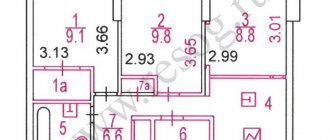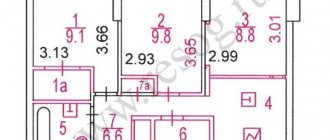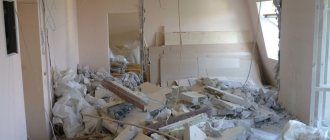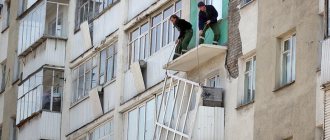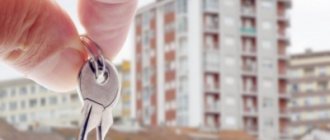When redevelopment is considered illegal
What is considered illegal redevelopment of an apartment? This is all work to change the space of a living space without permission. In cases where approval is not necessary (cosmetic repairs, replacement of finishing materials for balconies, etc.), the redevelopment cannot be considered illegal, since there are no violations of the law.
Reconstruction is illegal:
- when changes have been made for which the consent of the housing commission should have been given, but for some reason it was not formalized;
- repair work has been carried out that is prohibited by law (for example, partial modification of a load-bearing wall), see what can and cannot be done when remodeling an apartment.
In the first case, it will be necessary to legalize unauthorized work; in the second case, the owner will face serious responsibility and costs for bringing the home to its original form.
The owner also faces liability if the apartment with illegal redevelopment was received by him under a gift agreement or by inheritance (see inheritance and deed of gift for an apartment). When registering ownership in such cases, the technical passport is not a mandatory document, so you may not find out about the absence of notes on significant changes to the apartment in it. And yet, even when receiving an already redesigned home, all sorts of changes must be established and legalized (if possible), see how to legalize the redevelopment of an apartment yourself.
What redevelopment can be done without permission?
Without obtaining permission, it is allowed to carry out actions that do not make significant changes to the configuration of the apartment. It could be:
- cosmetic repairs - wallpapering, painting;
- changing doorways in interior walls;
- installation and demolition of partitions, in the case when this does not increase the load on the floor;
- replacement and transfer of plumbing or electrical equipment (except for the change of gas equipment to electric);
- installation and dismantling of antennas and air conditioners;
- construction of a partition.
The listed actions do not require approval, but after making adjustments to the configuration, you need to notify the BTI. An employee of the institution will come and take the required measurements. If the reconstruction is carried out correctly, changes will be made to the technical documentation within 10 days.
Fine for illegal redevelopment
For illegal redevelopment of an apartment in 2021, the following administrative fines are provided:
- for individuals (owners) of apartments located in apartment buildings - from 2000 to 2500 rubles ;
- for persons who changed housing in buildings of a different type (not apartment buildings) without approval (if it was necessary) - from 1000 to 1500 rubles , a warning is also possible.
As you can see, the fines are not too large. At the same time, judging by information in the media, the size of the fine will only increase in the coming years. In addition, its payment does not relieve the owner from the obligation to legalize unauthorized repairs or restore his home to its original condition.
The fine may be imposed by the inspector of the Housing Inspectorate of the territorial district at the location of the housing. Employees of this organization are required to respond to every message about unauthorized construction, repairs, etc. See judicial practice: the court decided to take away the apartment from the owner for illegal redevelopment.
The inspectorate can find out that the owner has not approved repair work that significantly changes the original layout:
- According to neighbors who have seen, know about your redevelopment or when their own interests are violated because of this;
- At the request of the HOA, management company or residential complex - organizations that have a direct responsibility to monitor the safety of living in apartment buildings and report any facts relating to this;
- From other sources: from anonymous requests, phone calls from any person, messages from the local police officer, who, by virtue of his authority, learned about the repairs. In this case, a statement (both oral and written) may only contain a request for an inspection (without an allegation of a violation) to determine the legality of the repair work carried out - in which case the inspector is obliged to “react” to the information received and visit the specified apartment in person.
If the inspection reveals signs of illegal redevelopment, the owner of the residential premises will face liability in the form of a fine, which the inspector will issue on the spot. In addition, he will issue an order to coordinate the work performed. In practice, employees of the Housing Inspectorate, when handing over such an order, explain in detail where to address such a question and what documents need to be submitted.
Consequences of illegal apartment redevelopment
According to the law, the consequences of illegal redevelopment may be as follows:
- Payment of a fine, which will be assigned by the housing inspection, and after that - the requirement to submit documents to legalize the redevelopment.
- If it is impossible to legalize the redevelopment in accordance with current technical and sanitary standards, the owner will receive an order to restore the original technical condition of the premises.
- If the previous two points are refused, the owner will lose his right to the property, and it will be sold at public auction.
The owner or tenant of the residential premises is responsible for unauthorized conversion, in accordance with parts 2-3 of Article 29 of the Housing Code of the Russian Federation.
If the redevelopment was carried out by the tenant, then only the owner who leased the premises can make a claim against him.
If the premises are sold at auction, the owner will receive the proceeds, however, minus the costs of restoring the proper condition of the home.
If the redevelopment was carried out by the tenant of the municipal premises, then if it is impossible to legalize the redevelopment, the social tenancy agreement with him will be terminated. The tenant himself and all members of his family will be evicted. The administration or municipality will be forced to restore the technical condition of the premises on their own and will try through the court to compensate for the costs and recover them from the previous tenant of the municipal premises.
When restoring the previous state of the municipal premises, a detailed acceptance certificate is drawn up.
Administrative sanctions will be punitive in nature:
- If during the process and as a result of the redevelopment no damage was caused to third parties:
— when re-equipping a residential building by an individual, the fine is 1-1.5 thousand rubles;
— when an individual refurbishes an apartment in an apartment building, the fine will be 2-2.5 thousand rubles;
— the fine on the official will be 4-5 thousand rubles;
— the fine imposed on a legal entity for uncoordinated redevelopment will amount to 40-50 thousand rubles.
- If the health and property rights of third parties are affected:
— the fine for an individual will be 5 thousand rubles;
— the fine for an official will be up to 50 thousand rubles;
- the company will pay 300-350 thousand rubles, but the amount of the fine can be increased up to 1 million rubles.
If it is possible to legalize the redevelopment, in addition to the fine, an order will be issued:
- Obtain a technical passport, for which you will need to go through the full legalization procedure.
- Correct the mistakes that were made as a result of the redevelopment, and then, after going through the full legalization procedure, receive technical documentation.
During the trial, the injured party can prove that third parties suffered significant damage. In this case, it can be proven in court that the offender’s actions were deliberate and he was aware of the consequences of his actions. In this case, the violator may face criminal liability.
If unauthorized reconstruction of housing cannot be agreed upon
If such violations are identified that it is no longer possible to legitimize an unauthorized change in the layout, the inspector will issue an order to return the premises to its original form. Sometimes it is almost impossible to fulfill such an order. So, if during the repair a load-bearing wall was affected, in which, for example, an opening was made, then returning it to the “as it was” position may not only be impossible, but also unsafe.
In such complex cases, a separate project is developed, which is carried out by firms with experienced housing staff. Note that the development of such a project is an expensive procedure, as is the restoration work itself, and it is clear that all these costs will be borne by the owner, who ignored the approval procedure.
When the owner refuses to legalize the redevelopment, the Housing Inspectorate has the right to sue him. According to Russian laws, a tenant can be evicted from an apartment only on the basis of a court decision. If the Housing Inspectorate goes to court with a claim, the owner of the property faces the forced sale of the residential premises at an auction price, termination of ownership and collection of the cost of restoration work. In practice, such cases are rare, but it is still worth knowing about the possibility of such consequences.
When should you go to court?
After the transaction, you may have to go to court to resolve the problems that have arisen. You will have to file a claim in two cases:
- if the administration refused to legitimize the reconstruction carried out by the sellers. The court will order a construction and technical examination, after which there is a chance to obtain permission to legalize the changes made. A positive court decision can be obtained only if the changes made are permitted;
- If you discover that an unacceptable alteration , you have the right to demand termination of the sales contract and a refund of funds.
In this case, the law will be on your side; the seller is obliged to return your money, as well as compensate for the costs of moving to a new apartment and pay for moral damages.
If illegal redevelopment is made in a mortgaged apartment
All bank collateral agreements contain a complete ban on any changes to the layout. If a tenant of an apartment with a mortgage nevertheless carries out illegal redevelopment without the consent of the housing authorities and the credit institution, you should remember that:
- A bank employee can come to the secured apartment at any time and check its technical condition, including the presence of structural changes, the removal of doors, partitions, and the safety of load-bearing walls. It is impossible to interfere with the inspection of a bank employee; this clause is expressly provided for in the loan agreement;
- Carrying out repair work that is not approved in accordance with the procedure established by law may result in the refusal of the insurance company to conclude a home insurance agreement with the borrower, which is subject to annual submission to the bank. The absence of such insurance is grounds for unilateral termination of the mortgage agreement at the initiative of the bank;
- if the bank becomes aware of an illegal change in the layout of the apartment, the consequences may be different, depending on the circumstances: forced approval, termination of the contract with the payment of a penalty, etc. The bank will definitely report violations to the Housing Inspectorate, due to which administrative liability will be added to the “mortgage” problems.
What specific actions are considered unauthorized?
Unauthorized redevelopment is a redevelopment carried out without obtaining permission. It is legally established that before starting work, the owner, tenant or tenant of the premises is required to submit an application attaching a project, sketches and descriptions of the planned work on redevelopment of the premises, its partial or complete reconstruction.
It is worth considering that even if there is an approved project, the owner or the person who received the power of attorney to carry out the redevelopment will have to answer for technical errors during the redevelopment or non-compliance with the project.
Legally, work that requires a permit includes:
- Moving or demolishing load-bearing walls and structures, which leads to an increase in the load on other load-bearing elements, no matter what kind of house it is: apartment, multi-storey or private cottage.
- Removal of heating elements, radiators or pipelines to a balcony or loggia.
- Connecting a heated floor to a hot water supply system.
- Relocating a bathtub and toilet and placing plumbing equipment in places not intended for it.
- Installation of partitions and additional walls to change the layout of an apartment or house, as well as increasing the number of rooms by dividing existing ones.
- Changing the size and shape of door and window openings.
- Moving the balcony, increasing its area, any change in the flights of stairs.
- Transfer and change of life support systems: ventilation, water supply, sewerage, gas pipeline and heating system, including transfer and replacement of radiators with a different type.
- Installation of new equipment, which involves moving and changing utility systems.
- An increase in the area of non-residential premises at the expense of residential premises, if this makes the total non-residential area larger by 25% or more.
- Demolition of the wall separating the kitchen from the living room, if there is a gas stove or water heater in the kitchen.
- Relocating rooms that use water so that wet rooms are located above the living spaces of neighbors below.
- Other significant changes.
When carrying out all work, they must be recorded step by step in a special journal, which is presented to the commission when accepting the redevelopment. Thanks to this log, the commission receives a complete picture of the work performed and can identify inconsistencies at a certain stage.
It is worth remembering that work on redevelopment of residential premises must be carried out by a company that has all the necessary permits and certificates. Unauthorized redevelopment can be dangerous both for the owner of the premises and for his neighbors.
Purchase and sale of an apartment with reconstruction without permission
Is it possible to sell an apartment with illegal redevelopment?
Theoretically, this can be done, but one must understand that the buyer will bear the full burden of responsibility. Therefore, when selling such an apartment, a certain difficulty lies in finding a citizen who will agree to buy housing, which will also be problematic to sell in the future if the redevelopment is not legalized. However, some specifically seek to purchase just such “problem” apartments due to a significant reduction in price (up to 30%).
What are the risks of buying an apartment with illegal redevelopment?
At a minimum, significant financial expenses, since it is the acquirer, as the new owner, who will have to go through the permitting procedure. If we are talking about a deliberate transaction to purchase just such an apartment (for example, for reasons of economy), then it is better to play it safe and, on the eve of the sale, invite a specialist to inspect the property, who will tell you whether it is even possible to legalize the changes made in the future.
What to do if you bought an apartment with illegal redevelopment and did not know about it?
In this case, it may be advisable to recover legalization costs from the previous owner through the court, since he did not inform you of the essential terms of the purchase and sale agreement.
How do supervisory authorities find out about illegal redevelopment?
The regulatory authority may become aware of illegal redevelopment of premises in standard situations, which are listed in the following list:
- Neighbors who learn about the redevelopment can contact the regulatory authority to inspect the premises for compliance with the standards and basic layout. This often happens when the sound insulation of walls is changed, or, for example, if neighbors suddenly lose draft in the ventilation duct.
- When eliminating the causes and consequences of utility accidents, when the utility lines of the house are checked.
- When concluding transactions for the purchase and sale of an apartment, house or non-residential premises.
- Conducting an inspection by employees of the Technical Inventory Bureau.
- During door-to-door visits by employees of public utility services and controllers of resource supply organizations in order to check and monitor individual metering devices.
If illegal redevelopment was done by neighbors
If you think that the repair work of your neighbors may have irreversible consequences for the safety of the entire apartment building, then you can write a complaint about this to the Housing Inspectorate. Where to complain if the inspector did not respond to your appeal and did not check your arguments? In this case, we recommend that you contact the district prosecutor's office with a statement.
Prosecutor of the Leninsky district of the city ______ Ivanov I.I. Petrova V.V., living at the address: ______, st. Lenina, 1, apt. 1 Tel.____________________
STATEMENT
I ask you to check the legality of the actions of the employees of the Housing Inspectorate of the Leninsky District of ________ under the following circumstances.
I sent a statement to the Housing Inspectorate about the need to check the actions of S.S. Sidorov, who lives in the apartment. 2, no. 1, on the street. Lenin. This citizen significantly enlarged the entrance door opening to his apartment by making double doors. At the same time, the wall on the western side developed a crack about 1 meter long. As a neighbor and resident of an apartment building built in 1981, I fear for the safety of my life and the technical condition of my home.
I reported these circumstances in my application, which I sent to the Housing Inspectorate on 01/01/2021, as of today Sidorova S.S. No one from the inspectorate checked, no measures were taken to identify violations on his part.
I ask you to check the legality of the activities of the Housing Inspectorate and check the legality of the repair work of the city. Sidorova S.S.
Enclosure: a copy of the application to the Housing Inspectorate, a photograph of a crack on the wall.
04/01/2021. ________Petrov V.V.
